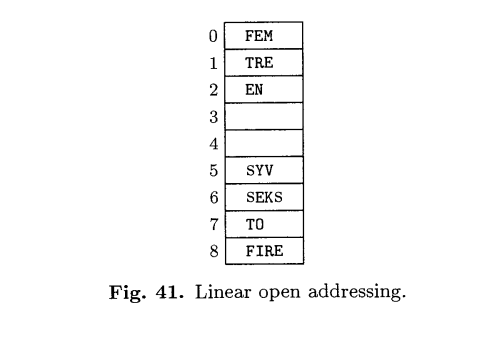Algorithm L
Algorithm L (Linear probing and insertion). This algorithm searches an M-
node table, looking for a given key K. If K is not in the table and the table is
not full, K is inserted.
The nodes of the table are denoted by TABLE[i], for 0 <= i < M, and they
are of two distinguishable types, empty and occupied. An occupied node contains
a key, called KEY[i], and possibly other fields. An auxiliary variable N is used
to keep track of how many nodes are occupied; this variable is considered to be
part of the table, and it is increased by 1 whenever a new key is inserted.
This algorithm makes use of a hash function h(K), and it uses the linear
probing sequence (20) to address the table. Modifications of that sequence are
discussed below.
L1. [Hash.] Set i <– h(K). (Now 0 <= i < M.)
L2. [Compare.] If TABLE[i] is empty, go to step L4. Otherwise if KEY[i] = K,
the algorithm terminates successfully.
L3. [Advance to next.] Set i <– i-1; if now i < 0, set i <– i+M. Go back to
step L2.
L4. [Insert.] (The search was unsuccessful.) If N = M-1, the algorithm
terminates with overflow. (This algorithm considers the table to be full
when N = M - 1, not when N = M; see exercise 15.) Otherwise set
N <– N + 1, mark TABLE[i] occupied, and set KEY[i] <– K. |
Linear open addressing
Java program
In this program, R1,…,RN were simplified to K1,…,KN.
package com.algorithms.searching;
/**
* Created with IntelliJ IDEA.
* User: 1O1O
* Date: 12/13/13
* Time: 6:52 PM
* :)~
* Linear Probing And Insertion:Searching
*/
public class Main {
public static int[] TABLE = new int[19];
public static int M = 19;
public static int N = 0;
public static void searchAndInsertNode(int key){
int hash = key%19; /*Hash function:h(K)*/
if(TABLE[hash] == 0){
TABLE[hash] = key;
N++;
System.out.println(String.format("%4s",key+":")+" not found in the hash table, then insert it in TABLE["+hash+"]");
}else {
if(key == TABLE[hash]){
System.out.println(key+" found in the hash table: TABLE["+hash+"]");
}else {
do{
hash--;
if(hash < 0){
hash+=M;
}
if(TABLE[hash] == 0){
if(N == M-1){
System.out.println("Error: Hash Table Overflow!"+", Key:"+key+" can not be inserted!");
break;
}else {
TABLE[hash] = key;
N++;
System.out.println(String.format("%4s",key+":")+" not found in the hash table, then insert it in TABLE["+hash+"]");
break;
}
}
}while (true);
}
}
}
public static void main(String[] args) {
/*Prepare the Hash Table: suppose all the numbers are not zero!!!*/
System.out.println("Prepare the Hash Table:");
searchAndInsertNode(503);
searchAndInsertNode(87);
searchAndInsertNode(512);
searchAndInsertNode(61);
searchAndInsertNode(908);
searchAndInsertNode(170);
searchAndInsertNode(897);
searchAndInsertNode(275);
searchAndInsertNode(653);
searchAndInsertNode(426);
searchAndInsertNode(154);
searchAndInsertNode(509);
searchAndInsertNode(612);
searchAndInsertNode(677);
searchAndInsertNode(765);
searchAndInsertNode(703);
System.out.println();
/*Print the current Hash Table with 16 nodes*/
System.out.println("Print the current Hash Table with 16 nodes:");
for(int j=0; j<19; j++){
if(TABLE[j] != 0){
System.out.println(String.format("%3s", j+":")+TABLE[j]);
}
}
System.out.println();
/*Search Node 765 in current Hash Table*/
System.out.println("Search Node 765 in current Hash Table:");
searchAndInsertNode(765);
System.out.println();
searchAndInsertNode(1);
searchAndInsertNode(2);
searchAndInsertNode(3);
searchAndInsertNode(4);
searchAndInsertNode(5);
}
}Outputs
Prepare the Hash Table:
503: not found in the hash table, then insert it in TABLE[9]
87: not found in the hash table, then insert it in TABLE[11]
512: not found in the hash table, then insert it in TABLE[18]
61: not found in the hash table, then insert it in TABLE[4]
908: not found in the hash table, then insert it in TABLE[15]
170: not found in the hash table, then insert it in TABLE[17]
897: not found in the hash table, then insert it in TABLE[3]
275: not found in the hash table, then insert it in TABLE[8]
653: not found in the hash table, then insert it in TABLE[7]
426: not found in the hash table, then insert it in TABLE[6]
154: not found in the hash table, then insert it in TABLE[2]
509: not found in the hash table, then insert it in TABLE[14]
612: not found in the hash table, then insert it in TABLE[1]
677: not found in the hash table, then insert it in TABLE[12]
765: not found in the hash table, then insert it in TABLE[5]
703: not found in the hash table, then insert it in TABLE[0]
Print the current Hash Table with 16 nodes:
0:703
1:612
2:154
3:897
4:61
5:765
6:426
7:653
8:275
9:503
11:87
12:677
14:509
15:908
17:170
18:512
Search Node 765 in current Hash Table:
765 found in the hash table: TABLE[5]
1: not found in the hash table, then insert it in TABLE[16]
2: not found in the hash table, then insert it in TABLE[13]
Error: Hash Table Overflow!, Key:3 can not be inserted!
Error: Hash Table Overflow!, Key:4 can not be inserted!
Error: Hash Table Overflow!, Key:5 can not be inserted!Reference
<< The art of computer programming: Sorting and Searching >> VOLUME 3, DONALD E. KNUTH
